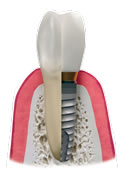December 1, 2018
 When you have missing teeth or are facing the prospect of losing any of them, you may start exploring a variety of treatment options ranging from dentures to dental implants. Technology has advanced to accommodate people who need teeth replacement options, and implants have grown in popularity. Dr. Hal H. Kimowitz and Dr. Adam Kimowitz of Denville Dentist offer both regular implants and mini dental implants to assist in treating patients. What is the difference between these two options?
When you have missing teeth or are facing the prospect of losing any of them, you may start exploring a variety of treatment options ranging from dentures to dental implants. Technology has advanced to accommodate people who need teeth replacement options, and implants have grown in popularity. Dr. Hal H. Kimowitz and Dr. Adam Kimowitz of Denville Dentist offer both regular implants and mini dental implants to assist in treating patients. What is the difference between these two options?

The Low-Down on Dental Implants
Conventional root form implants include embedding a titanium post into the jawbone and gums of the patients. This acts much like the root of a tooth that stimulates the bone and prevents deterioration. The post is long enough to secure the implant in place and fuses to the bone through osseointegration. This procedure is meant to be a permanent solution for missing teeth. The post should not come out unless it falls out for some reason. Implants can last for decades or a lifetime.

The Mini Dental Implants Treatment
Mini dental implants were designed to be a temporary solution while patients healed from certain procedures, such as the placement of crowns and bridges. They are meant to be easy to insert and remove, which also means they have a higher failure rate if left in for extended periods of time. Drs. Hal and Adam Kimowitz may use mini implants to facilitate healing from other procedures, but they will not leave them in as a permanent solution.
The Right Choice
Whether you need conventional rootform implants or mini implants depends entirely on your situation and the procedure you will be having. If you are looking to permanently replace a missing tooth with something that looks functions like natural teeth, a conventional dental implant may be the right choice. If you are receiving bridgework and just need an implant temporarily, a mini dental implant may meet your needs.
Contact Us To Learn More
The first step is to have a consultation with Dr. Hal Kimowitz or Dr. Adam Kimowitz to evaluate your needs. To learn more about our implants and other procedures, contact us today.
